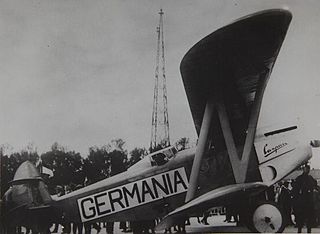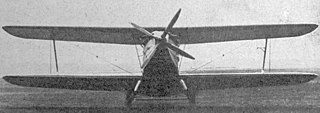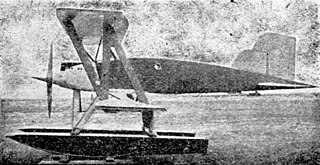Related Research Articles

The Zivko Edge 540 manufactured by Zivko Aeronautics is a highly aerobatic aircraft. Capable of a 420 degree per second roll rate and a 3,700 foot per minute climb rate, it has been flown to victory on the international Unlimited aerobatics circuit several times since the mid-1990s. A tandem-seat version is sold as the Edge 540T.

The Caspar C 32 was an aircraft developed in Germany for aerial spraying in the late 1920s. It was a single-bay biplane with staggered, equal-span wings that accommodated the pilot and a single passenger or observer in tandem open cockpits. A small, additional horizontal stabiliser was fitted near the top of the tall single tail fin above the main horizontal stabiliser.

The Caspar C 35 Priwall was a German airliner of the late 1920s, of which only a single example was built. It was a large, single-engine, single-bay biplane of conventional configuration with fixed tailskid undercarriage. The staggered, equal-span wings were braced with a large I-strut. Not only were the passengers seated within a fully enclosed cabin, but the flight deck was fully enclosed as well.

The Dewoitine D.19 was a fighter aircraft built in France in 1925 in response to a French Air Force solicitation.

The Focke-Wulf A 20 Habicht was an airliner developed in Germany in the late 1920s. It was a high-wing cantilever monoplane with fixed tailskid undercarriage. The fuselage was deep and seated four passengers in a fully enclosed cabin. The type was not bought by the airlines and only a few examples were built.

The Caudron C.362 and the almost identical C.366 were single-seat racing aircraft built in 1933 by Caudron to compete in the Coupe Deutsch de la Meurthe competition.
The Caspar C 30, aka Caspar LE 30 was an aerial reconnaissance aircraft developed in Germany and built in Denmark in the late 1920s.
The Caspar C 36 was an aircraft developed in Germany for aerial reconnaissance in the late 1920s.
The Caspar C 24 was a German two-seat biplane sports aircraft that flew in 1925.

The Caspar C 26 was a sports aircraft developed in Germany in the mid-1920s.

The Caspar C 27 was a training seaplane aircraft developed in Germany in the late 1920s.

The Caspar C 29 was a 2-seat floatplane mail carrier and reconnaissance developed in Germany, but built by Dansk Aero in Denmark in the mid-1920s.
The Caspar C 33 was a training aircraft developed in Germany in the late 1920s.
The Caspar CT 1 was a sports aircraft developed in Germany in the early 1920s.
The Caspar U 2 was a recce floatplane built for Japan in the 1920s.
The Caspar CS 14 was a German military aircraft built in the 1920s. At first it was seen as a single seat fighter but was later modified to the reconnaissance role with a second seat.
The Caspar CLE 11 was a cantilever-parasol monoplane cabin airliner built and flown in Germany in 1923.
The Caspar CLE 16 was an airliner built in Germany in the early 1920s.
The Caspar CLE 12 was an airliner built in Germany in the early 1920s.
The SFAN 5 was a two-seat French motor-glider built in the late 1930s.
References
Citations
- ↑ "Caspar C 23". Histaviation.com. Retrieved 26 February 2019.
- ↑ "Caspar C.23". www.airwar.ru (in Russian). Moscow. Retrieved 26 February 2019.